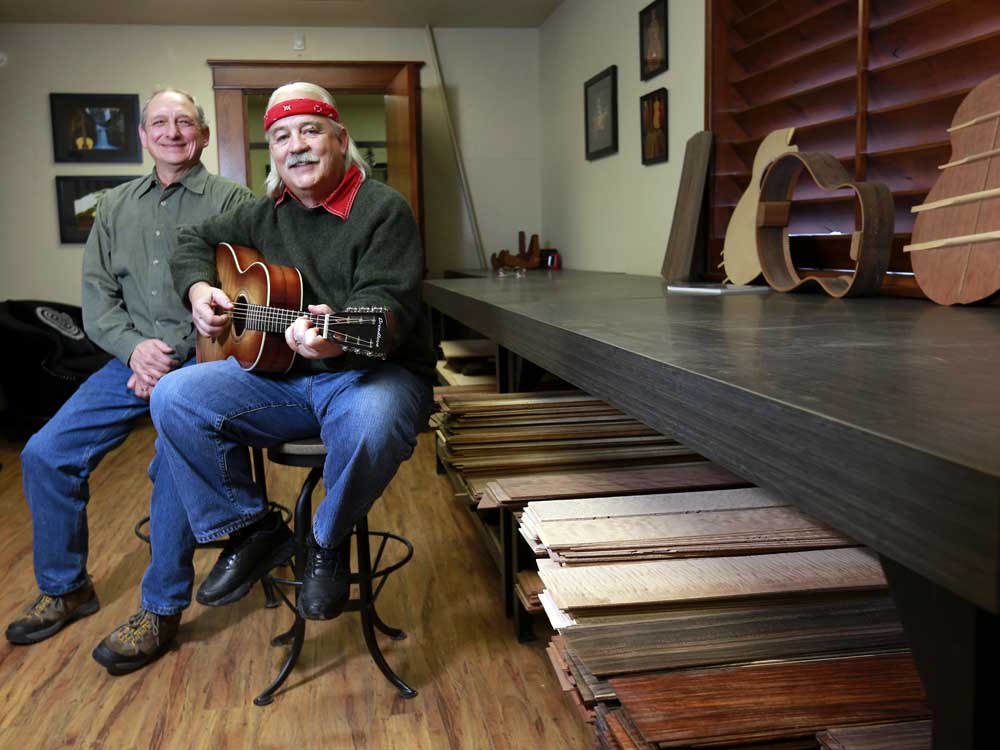Going green with guitars
Published 12:00 am Friday, December 26, 2014

- Joe Kline / The BulletinTom Bedell, right, owner of Two Old Hippies, and Tom McCord sit in the guitar design studio with samples of wood used to make instruments at the companyís location in Bend. McCord and Bedell have worked to ensure all the wood used in instruments made by Two Old Hippies is sustainably sourced.
A confluence of environmental stewardship, technology and activism is taking place in Bend, and it may change the way guitar manufacturers all over the world do business.
Tom Bedell, co-owner of Two Old Hippies in Bend, announced at the beginning of the year that all of the company’s Bedell brand of guitars would only be made from dead, fallen or sustainably harvested trees. Two Old Hippies is the parent company of Breedlove, Bedell Guitars and Weber mandolins.
It’s been nearly one year into the company’s radical change in policy. Executing that policy change has had its share of challenges, but as Two Old Hippies heads into 2015, the company appears poised to lead the guitar-making industry into the next era of business-driven environmentalism.
Bedell’s call to action was borne in part out of a desire to do right by the environment and also in reaction to changes in the Lacey Act, a 1900 ban on trafficking illegal wildlife that was amended in 2008 to include plants and plant products such as timber. The U.S. Fish and Wildlife Service enforces the Lacey Act in tandem with CITES, an international treaty between 180 countries that protects more than 30,000 species of plants and animals.
In 2001 the federal government raided Gibson Guitar Corp. in Tennessee and found illegally sourced tropical hardwoods in the guitar giant’s supply chain.
The incident sparked an outcry from Gibson and other timber-using industries. Some worried they could be penalized for possessing woods deemed illegal after they were purchased.
Many wood suppliers, accustomed to the lack of regulation prior to the Lacey Act amendment, choose not to keep records in an attempt to keep their sources secret, said Bedell. The incident demonstrated just how seriously the federal government is taking the Lacey Act’s enforcement.
“We believe, regardless of the law, we should be making sure that we’re harvesting wood consistent with sustainability,” Bedell said.
Aside from raids of highly visible companies, the Lacey Act is largely enforced by U.S. Customs and Border Protection. If an agent suspects a guitar passing through customs is constructed out of, for example, Brazilian Rosewood, a species protected by CITES since 1975, the agent can confiscate the instrument until its owner proves the wood was legally harvested. The agent can also ignore it, “which is 90 percent of what happens,” Bedel said.
The supply chain
To tackle the enforcement challenges and communicate the company’s environmentalist ethos, in 2015 Two Old Hippies is taking documentation to an unprecedented level. All Bedell guitars purchased in the new year will include a certificate listing each species of wood used and its country of origin. The company will also help owners whose guitars contain Brazilian Rosewood obtain a passport issued by U.S. Fish and Wildlife for travel outside the country.
To make sure Bedell’s wood suppliers are in compliance with its new mandate — only salvaged or sustainably harvested wood, no clear cuts — Bedell brought Tom McCord on board as a tonewood buyer. He was a wood supplier to Two Old Hippies before Bedell hired him in February. It’s an uphill job, even for a man with 37 years’ experience buying and selling domestic and imported hardwoods.
McCord has found “acceptance by a lot of suppliers and resistance from a few,” he said.
Alaska Specialty Woods, for example, already finds most of the Sitka Spruce it sells on the forest floor or from dead standing trees. But other suppliers have refused to give McCord the information he needs to ensure compliance.
To find new suppliers, McCord relies on the Rainforest Alliance, a nongovernmental organization that helps countries with vulnerable ecosystems use their resources while improving communities and forests. The alliance helped him find a logging concession in Petén, Guatemala to supply the mahogany Bedell uses in its guitar necks.
TreeTag
The Rainforest Alliance also connected McCord with Andrew Dudley, an English activist searching for opportunities to test drive a new technology he believes will end deforestation.
Dudley, also known as the Jungle Bird, gained international notoriety for videobombing televised sporting events. It started with the U.S. Open’s Trophy Ceremony in 2012, when Dudley wandered in front of the camera wearing a red, white and blue mohawked Union Jack beanie. He did a bird call and shouted, “Stop deforestation,” before security guards yanked him off camera. Since then he’s showed up at several other sporting events and been interviewed on late night talk shows .
Being a father to six children caused him to think seriously about the consequences of climate change, he said.
“You’ve got the Congo basin and the Amazon basin, and they are like the left and right lungs of the planet,” he said. “If they continue to cut down trees at the rate they are today, that’s going to have an adverse effect on the future of the planet.”
Two Old Hippies hopes to be one of the first companies to pilot Dudley’s TreeTag system, which uses smart phones and satellites to monitor logging activity. The technology is designed for small-scale logging concessions. It allows loggers to take a digital picture of the stump after a tree has been cut down, which acts like a thumbprint and creates a digital supply chain.
If TreeTag works, Dudley, Bedell and McCord believe the digital system would be a huge improvement over the current gold standard of environmental protection: Forest Stewardship Council certification. FSC is an international nonprofit, and its certificate ensures consumers that the forests from which their wood or paper products came have been sourced responsibly.
“We want to set ourselves apart and be better than just baseline,” MrCord said. “FSC is not the be-all, end-all of certification. It’s a good system, but it has its weaknesses.”
FSC certification can be prohibitively expensive for smaller logging concessions, which is why Two Old Hippies’ supplier in Guatemala formed a cooperative with other small logging groups in the area to pay for it, McCord said. Dudley’s main concern with any paper-based system, like FSC, is the opportunity for bribery.
Regrowth
Bedell’s objective is to protect old-growth trees. “For whatever poetic reason, those hardwood and rainforest trees deliver the best tonewood,” he said.
FSC may ensure that a forest grows back, but in 100 years rather than 500, “because there’s no competition. If you’re looking for pulpwood to make toilet paper or something like that, you bet. It regrows. If you’re looking for beautiful tonewood, it doesn’t regrow. Even the FSC standards don’t protect this precious wood that Mother Nature has given us.”
Two Old Hippies’ logging concession in Guatemala only cuts 20 percent of the mahogany trees in its forest, and doesn’t return to that area for 25 years. Bedell and McCord believe this method protects old-growth forests more than most FSC practices.
McCord and Dudley visited Guatemala in October. McCord inspected a trial order of mahogany, which met his scrutiny. Dudley introduced the loggers to TreeTag, and although they weren’t able to do a full trial run due to heavy rains, the technology seems conceptually workable. They hope to do a full trial run in February or March, when they will begin to cut down McCord’s second order of mahogany.
“We’re bringing the industry into the 21st century by using the latest technology,” said Dudley. “We’re not focusing on illegal logging, because it’s too big of a problem to tackle. We’re giving the legal guys, the good actors, a digital, secure system to transact trees.”
With or without TreeTag, Two Old Hippies expects its certificate system to be standard practice in the coming years.
“It’s something we believe we should be doing regardless of the law,” said Bedell. “But the beautiful thing about the laws now is it makes everybody else have to do that as well.”
— Reporter: 541-383-0354, jrockow@bendbulletin.com
Editor’s note: This story has been clarified. In an earlier version the result of raids on the Gibson Guitar Corp. was unclear. The U.S. Justice Department found what it believed was illegally sourced wood, but the department and the company subsequently reached a settlement in which the company paid a fine of $300,000 and the government agreed to drop criminal charges.






